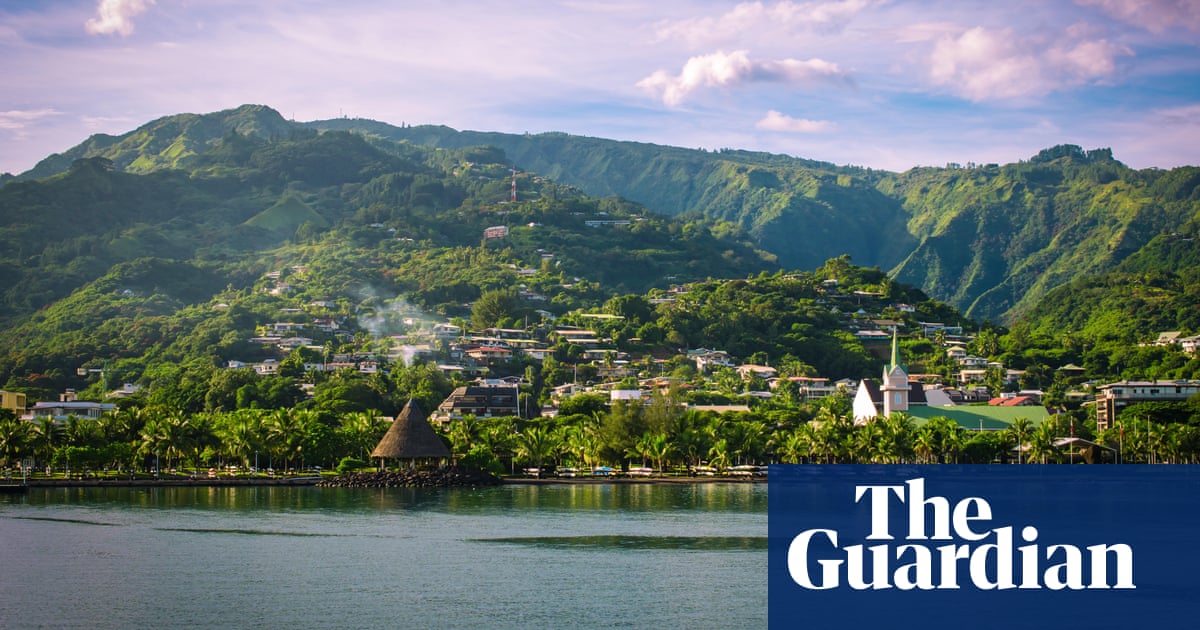The French President of Polinisia issued a flagrant warning about the risk of mining in the depths of the seas, saying that he would be allowed in his lands “on my bodies” because he argues that the possibility of environmental damage outweighs any benefits.
Moetai Brotherson’s comments on the Guardian as a country in the Pacific Ocean and other places struggling with mineral extraction from the sea floor. Mining has not started in the depths of the seas yet, but some companies and countries explore this practice, which may start in the coming years.
The brothers said from his office in my father: “We play the gods in the cradle of life – and this is very dangerous.”
When asked if he would think about mining the depths of the seas in the future, the brothers said: “On my body.”
French Paulisia is located in the South Pacific in the middle of the road between Australia and South America. It consists of more than 100 islands, including Tahiti and Bora Bora. Although it is still technically under French sovereignty, the islands are largely independent, with their governmental laws, currency and local laws.
According to the Authenticity Act of French Polynesia, France ultimately enjoys the judicial state over what “strategic materials”, which include minerals at the sea floor. The two brothers management tries to adjust the statute.
The two brothers were elected in 2023 as a member of the Tafini Party, Huiraratra, which is supportive of independence. He said that mining in the depths of the seas was a “temptation” for the countries of the Pacific Island, which may see practice “an abbreviation to a better social and economic situation.”
The depths of the depths of the seas include extracting minerals and minerals such as nickel, cobalt and copper from the bottom of the deep sea, at a depth of greater than 200 meters. These minerals are used in a group of products including batteries, electronics and renewable energies.
Supporters say that deep sea mining will support the transmission of green energy and help develop the economies of the Pacific Island. Others argue that practice can have a devastating effect on the sea floor, and that the long -term consequences of the environment and ecosystems of oceans are not confirmed.
The depths of the seas divided the governments of the Pacific Island. While some, including French Polynesia and Micronesia, are inconsistent with the idea, others such as the Cook and Noro Islands are actively pursuing partnerships with mining companies as a way to diversify their economies.
In February, the Cook Islands signed a strategic partnership deal with China, which included cooperation to explore the depths of the seas in the exclusive economic zone of the Cook Islands (EEZ). In March, Kiribati announced that it would also explore The depths of the seas with the seas with China. Other large states, including Russia and South Korea, have held exploration contracts, and companies are pressing to start deep sea mining.
While the two brothers support the right of the Cook Islands to exploit its deep resources, it does not agree with it.
“From our point of view, it is very annoying because it places a precedent and also ignores the fact that lower pollution has no limits,” said the brothers, who pointed out that pollution from mining in the Cook Islands may end in the waters of French Polinzia.
Dr. Lorenz Gonchor, an expert in the regional and governance in the Pacific at the South Pacific University, said that the exploration of deep Ocean resources is likely to happen in the future.
He said that “the large ocean countries”, the emerging practice gave the Pacific Islands, “is tremendous importance in the sense that they will now get huge economic resources.”
French President Emmanuel Macron is currently supports a ban on the depths of the depths of the seas, but the brothers are afraid to change with the election of a new president in France.
France has complicated relations with the colonies of the Pacific Island, which also includes New Calidonia, Wags and Feotona. New Calidonia witnessed violent turmoil and protests last year, which raised the voting reforms proposed by the French Parliament.
The two brothers publicly stated that he would consider holding a referendum on independence from France in the next 10 to 15 years.
However, France did not show any indication of the move towards ending colonialism for French Polynesia, and rejected calls for independence in the United Nations Special Committee in 2023 concerned with ending colonialism and continuing to maintain an active military presence in the islands. Macron stressed, during his recent visit to French Polynesia in 2021, to strengthen the current relationship.
Gonschor has acknowledged that the independence of French Polynesia will be a “great challenge”, especially because of its history of economic benefits and “superficial development” from France. However, he believed that there was an opportunity to see independence in our lives.
“From a geopolitical point of view, it cannot be avoided. In the long run, France will not be able to maintain these external colonies.”
Brotherson is ready to take a slow road to secure independence “the right path” and start building the “self -economic lung” of French Poles, which includes sustainable tourism and energy -moving, in addition to a move to increase the local agricultural sector and give priority to the digital economy.
The brothers said: “I prefer not to see independence in my time if it is transferred and a mistake … it would be great to see it, but it is not about me.” “It is about people in the country.”
adxpro.online
